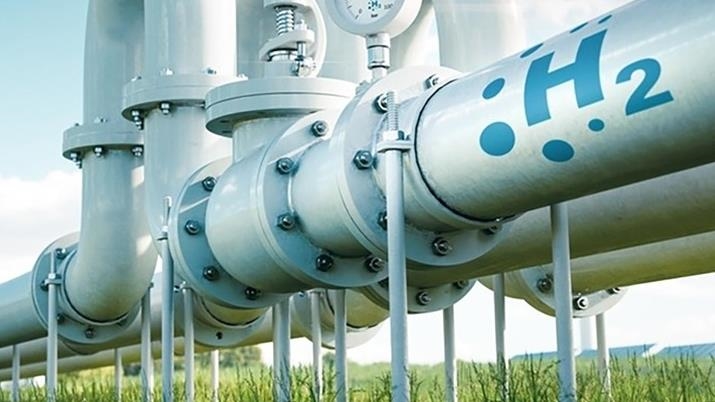Green hydrogen, produced via clean energy sources, emerges as a key contender for sustainable energy, offering an energy-dense, eco-friendly fuel
Seda Sevencan |12.12.2023 -

- Green hydrogen, produced via clean energy sources, emerges as a key contender for sustainable energy, offering an energy-dense, eco-friendly fuel- "In many countries, hydrogen projects are getting support or political discussions are ongoing," expert tells Anadolu
- Countries that possess inputs needed for green hydrogen production, like water or renewable energy resources, may gain importance as transition progresses
ISTANBUL
As the world grapples with the challenge of adopting sustainable energy, hydrogen, the universe’s lightest element has emerged as a candidate to do much of the heavy lifting.
Both plentiful and energy-dense, hydrogen is touted as an environmentally friendly fuel that, when combusted, emits pure but water vapor.
However, this does not make it necessarily carbon-free.
While abundant in the atmosphere, hydrogen is difficult to procure in gas form. Instead, it needs to be separated from other substances, such as water or natural gas. This takes energy, which must come from clean sources if hydrogen is to play the desired pivotal role in the transition.
To differentiate hydrogen fuel made via carbon-free sources as opposed to polluting methods, a color-coded system has been devised, referring to the variety produced using renewables like solar or wind power as “green hydrogen.”
According to the UN International Renewable Energy Agency (IRENA), green hydrogen can be particularly helpful in eliminating carbon dioxide emissions in “challenging sectors” like steel, chemicals, long-distance transport, shipping, and aviation. As renewable power costs continue to decline, it is expected to become cost-competitive by 2030.
Today, it is growing more popular and hydrogen is rising on the agenda of many governments, launching numerous pilot projects and policies around the world.
“Fifty-seven countries, mainly in Europe, have developed their own national hydrogen strategy or roadmap, and around 37 countries are preparing a national hydrogen strategy,” explained Mehmet Serif Sarikaya, project and international relations manager at Gazbir-Gazmer, which is an umbrella association of natural gas distribution companies in Türkiye.
“In many countries, hydrogen projects are getting support or political discussions are ongoing,” he told Anadolu in an interview.
While Europe, Australia, and Latin America currently appear to have launched the greatest number of green hydrogen initiatives, a look at actual progress reveals that many of these projects are making little, according to Anne-Sophie Corbeau, a global research scholar at Columbia University’s School of International and Public Affairs.
When it comes to key technologies behind renewable hydrogen, such as electrolysis, by which water molecules are separated into their constituent hydrogen and oxygen atoms, China is currently leading in terms of installed electrolyzer capacity, Corbeau added.
By the end of 2023, China is expected to account for roughly half of global installed capacity, she underlined.
Influence on International relations
Green hydrogen may also come to have a major impact on international relations, according to Sarikaya.
“International cooperation for green hydrogen production and trade is increasing. By coming together in the production, storage, and trade of green hydrogen, countries can increase energy security and contribute to the fight against climate change.”
However, access to key inputs needed for green hydrogen production, like water and renewable energy resources, may also be the cause of geopolitical disputes, he said, elaborating:
“Countries with these resources may gain importance as energy-rich countries. Access to the resources needed for green hydrogen production can influence international relations and change geopolitical balances.”
Hydrogen has already started to affect relations between nations, Corbeau pointed out, noting the many bilateral cooperation hydrogen agreements signed on the development of technology, projects, and strategies.
Türkiye’s potential
Highlighting Türkiye’s substantial potential for green hydrogen production, utilization, and exports, Sarikaya underscored the nation's commitment to advancing projects in this field.
“The fact that Türkiye has renewable energy resources and water resources means that it has favorable conditions for green hydrogen production. With its geopolitical position and renewable energy resource potential, Türkiye can seize the opportunity to gain a strong foothold in the global green hydrogen market,” he said.
Still, it requires increased investment and technological support to remain competitive on the international stage in this sector, Sarikaya added.
Future promise
Globally, green hydrogen is expected to be central in the effort of limiting global warming by decarbonizing the energy system.
“The Paris Climate Agreement aims to keep global warming well below 2 C above pre-industrial levels and even limit the temperature increase to 1.5 C. Decarbonization technologies play a critical role in achieving this goal," said Sarikaya.
“For this reason, the need for hydrogen in particular will be greater than ever. Hydrogen can be used not only as a means of decarbonization, but also as a means of energy storage and transfer. Thus, the scope of renewable power generation can be increased.”
Drawing attention to the substantial hype surrounding hydrogen a few years ago, Corbeau said this had now changed and that people understood that what is needed is steel in the ground and for projects to move forward.
She also underscored the need for governments in many parts of the world to finalize regulations so investments can proceed, while adding that global certification measures also need to be taken.
When it comes to climate change, Sarikaya said green hydrogen stands out in sectors that are difficult to decarbonize, but certain limitations, such as production costs and energy efficiency, may still pose a challenge.
Hydrogen is the third-best solution to help to decarbonize our energy system after energy efficiency and electrification, according to Corbeau. “We are not moving to a 'global hydrogen economy' where hydrogen will be used everywhere, but hydrogen will help us reach the full decarbonization.”
No comments:
Post a Comment